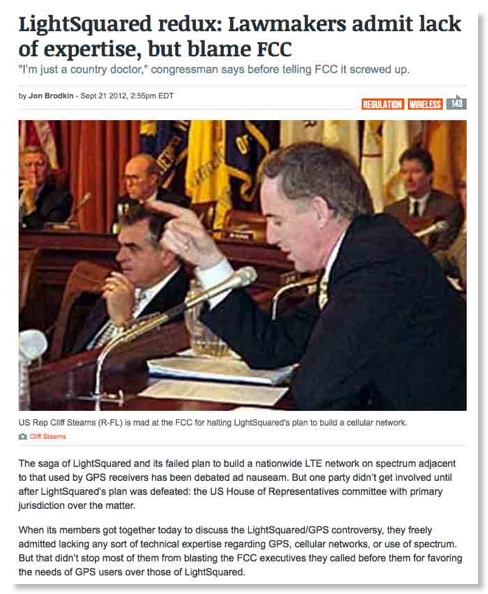Partisanship and Spectrum Policy

Here is some of the coverage of a recent hearing of the Subcommittee on the GPS/LightSquared issue by our fellow bloggers at Ars Technica.

The hearing, video of which is available below, had the committee members chewing out my former colleagues International Bureau Chief Mindel De La Torre and OET Chief Julius Knapp, on why they halted LightSquare’s system. They repeated insisted on yes/no answers on questions that were complex and had not straightforward answers. Here is an example:
Rep. Stearns: “Each operator has the responsibility to stay in its lane, using your analogy, is that correct?”
De La Torre: "Yes."
Rep. Stearns: “When one operator veers into the adjacent lane, is it the responsibility of an operator to correct its course, or is it the role of the FCC to patrol the highway? Briefly."
De La Torre: “Really, what was happening here was…”
Rep. Stearns: “Isn’t it the responsibility of the operator to correct its course? Yes or no?”
De La Torre. “It’s a difficult question. That’s the question that's before us, and I think…”
Rep. Stearns: “Yes or no? I'm asking for a yes or no, to the best of your ability.”
De La Torre: “I think they do have a duty to respond…”
Rep. Stearns: “OK, I'm going to take that as a yes.”
One of the odder exchanges was reported by Ars Technica as:
US Rep. Brian Bilbray (R-CA), an avid boater, said he understands the importance of GPS for safely finding one’s way home. But, "on the flip side," he said, more spectrum devoted to iPhones can improve safety too. "Just as much as GPS is essential there are thousands of people offshore every day that would have a huge safety factor if they could pull up an iPhone, and from 200 miles offshore be able to call for emergency services," he said. "This has a safety issue going both ways."
Rep. Bilbray, conventional cell phones including iPhone, do not work and will never work from “200 miles offshore”. MSS systems like Iridium and the service offered by LightSquared’s presently operational MSS system (designed to share spectrum with their proposed but threatened terrestrial ATC system) do. It is ironic that what triggered the current imbroglio was LightSquared trying to offer cellphones that were terrestrial only as opposed to bulkier ones previously authorized by FCC that included both MSS and terrestrial(ATC) service.
Months before the Republicans of the Energy & Commerce Committee came late to the GPS/LS issue, their fellow Republicans on the House Armed Services Committee criticized FCC for the exact opposite reason: why did they ever consider authorizing LightSquared as opposed to kowtowing to GPS interests and their self-centered view of spectrum policy.
So House Republicans, which is it? Is the current FCC wrong for considering LightSquared at all or it is wrong for not defending them again GPS interests? Perhaps both reasons are good enough to bash the present FCC and by implication the White House? Note that there were multiple FCC decisions under Chmns. Powell and Martin that supported ATC and LightSquared and its predecessors and that GPS interests participated in those decisions without major complaints at the time.
On September 13th, the Committee’s Subcommittee on Communications and Technology dumped on NTIA at the behest of cellular interests.
This time NTIA’s Karl Nebbia was beat up by the subcommittee members who were really angry over the PCAST report that Karl probably personal dislikes but had to defend as part of his job. While the free trade press did not cover this event, Keystone Public Affairs has posted this summary.
In both September hearings the committee’s subcommittees were trying to make partisan hay out of US spectrum management issues. The reality is that there are major problems in our present spectrum policy decision making in the US as any longtime reader of this blog has read multiple times. The roots go back decades and are bipartisan in nature. What we really need to to keep spectrum policy bipartisan as it generally has been and work together to improve the process.



![Validate my RSS feed [Valid RSS]](valid-rss-rogers.png)

